Three years ago, I ventured alone half way across our planet to one of the world’s most precious, majestic and fascinating regions, namely the Amazon rain-forest. I had only ever read about the Amazon in textbooks or seen it on the television. To enter the complex, ever changing haven of diverse life was an overwhelming experience I will never forget. I was fortunate enough to be given the opportunity thanks to the Royal Geographical Society. Below is a travel article I wrote that won the Ede & Ravenscroft Prize about my adventure, I hope you enjoy it.
As I lay on my back and took in my surroundings, I could not help but think how lucky I was to be on this small wooden peque peque boat traveling down Yanayaku River – a tributary of the Amazon in Northern Peru. The serene river was home to an eclectic array of wildlife from the dolphin who took it upon himself to follow us, to shiny orange piranha we glimpsed glistening on a man’s fishing line. Spectacular birds swooped across the river without a care in the world before our very eyes. Then there were the extraordinary sounds emanating from the jungle’s lush interior. The howler monkey with its deep groan and the many birds performing their various courtship rituals along with their exotic chirps.

Within half a day of journeying down stunningly beautiful and majestic rivers of this verdant paradise we reached a village named Viente de Enero – home to one hundred people. Here we moored our boat and treated ourselves to a spot of lunch on the riverbank with, the village’s mayor. And that evening I had my first of many swims and washes in the river. It was magical. As I immersed my body in the cool waters of the Yanayaku, distant dolphins danced their intricate and graceful waltz – leaping and diving while the river remained tranquil and still. Beyond the perpetual sounds of wildlife, we could now hear children in the village playing. This seemed like a village that was at ease with itself – free from the worries and anxieties of the modern, so-called civilized world. While the children played their simple games and went to school, the adults did little in the way of work other than to occasionally collect Aguajales fruits in the mornings.
Later that day, following a light dinner of rice and tuna, we observed the sky as the sun set and darkness descended. The night-time skies here are, as you’d expect, wonderfully clear. Among the countless shimmering stars sprinkled across this velvet black canvas, you can see Venus and if you’re lucky, the occasional shooting star.
The next morning we embarked on our final part of our journey to reach Rinon (an area of forest known to have extensive peat deposits). This was one of the sites that Freddie (the PhD student I was assisting) wanted to measure for his research. With us to help out were field work assistants – Hulio, Hugo and Luis. This part of the boat journey was just as incredible as the last.
On finally reaching our destination, we checked the GPS and it affirmed that Rinon lay to the right, so we pulled the boat in trying to avoid the trees. Freddie jumped out first and climbed up the bank. He then stumbled slightly, froze for a split second, and then rushed back down the bank and rocketed back into the boat, announcing that he’d just encountered a ‘hergone’ – a deathly snake. Hulio and Hugo immediately grabbed their machetes and in the excitement, our cardboard box with all the food supplies fell over the side of the boat. Fortunately, Freddie leapt to save it and managed to haul the soggy box back onto the boat. Disaster averted, the team prepared to deal with the snake. Positioning themselves deftly close to the deadly reptile, Hulio and Hugo then proceeded to smash it with their machetes countless times until it was cut in two. Then they continued just to make sure it was well and truly dead.
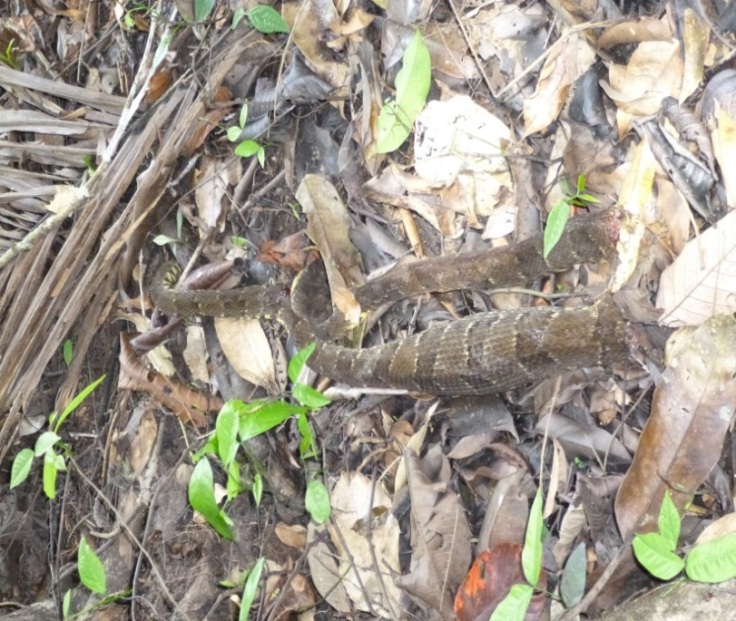
On inspecting our food supplies, it became apparent that we had in fact lost a few tins of tuna to the bottom of the river. In the circumstances, I think we got off lightly.
‘Welcome to the jungle Sarah!’ The guys beckoned me over to witness the dead snake twitching. At first, I thought my eyes were playing tricks on me but it moved again and again. You could see a bulge in its stomach where it had eaten a rodent of some sort. Could it still be alive? No of course not; Hulio explained that it was just muscle spasms.
The next task was to set up camp. The guys chose a perfect spot and then went to work. Hulio and Hugo chopped down any trees that were in the way and we used these to build a den-like structure to put our tents under. Using ribbon we tied a huge plastic sheet over the tree structure we constructed. Next the kitchen area was made and we laid out all of our food. Finally Hugo dug out a toilet which was 20 meters or so away from our tents. Our boat was used as a washing facility where with a bucket we could pour river water over ourselves while sitting in the boat. I got bitten all over by mosquitos when washing. Other than that this, it was an adequate system.

Before dinner, we were very fortunate to spot three River Otters; their little heads poking out of the river opposite. They are rare sighting – so this was a real bonus. Dinner was a far more common sighting – eggs plain and simple. When I got in my tent that evening it started to rain incredibly heavily. The noise was magnificent and the rain so great that I felt it; the droplets somehow traveled past the plastic roof and found their way through a tiny hole in my tent and landed on my face.
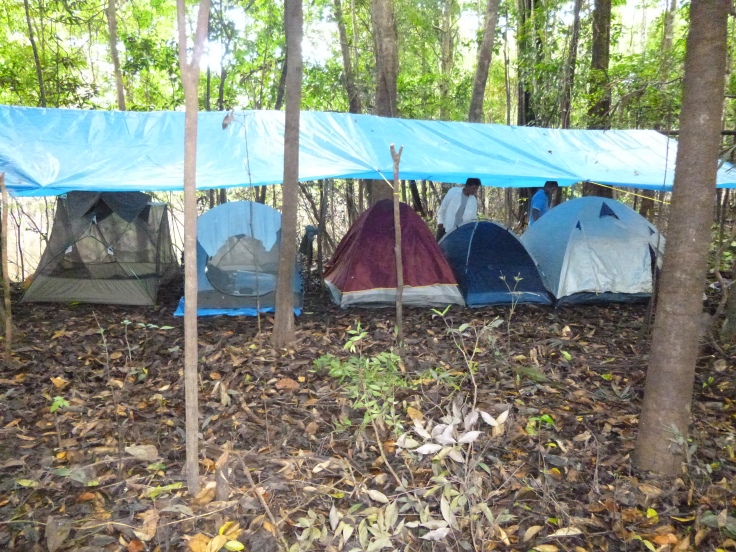
The next morning it was time to start the hard work and collect some data for Freddie’s PhD. We had a hearty breakfast of two eggs with rice and sweet porridge – Quakers. I made tomato and sardine pasta for our packed lunch, though sweat bees were to become a real nuisance – I just couldn’t keep them from flying into the pasta. Oh well, extra protein! After packing our bags with our sardine and sweat bee lunch we were ready to head off. Hulio and Hugo went first with their machetes cutting down the obstructing branches and trees blocking our way. My role was to mark with a fluorescent, pink ribbon every 100m point. I labelled the ribbon with a sharpie pen and tied it to a tree at eye level so it was visible. We got just over 1km and back. This took us the whole day as the path was treacherous, requiring us to spend much time wading through water. In effect, we were negotiating an obstacle course as we had to avoid the tree branches carrying spikes and biting insects, while desperately trying not to sink into the mud – most of which was very deep. A few termites went down the back of my shirt and bit my neck and arms. It stung for five minutes or so, leaving me with an impressive bite mark to show off. As we stopped for lunch it started to rain heavily so we got our ponchos out. The rain came crashing down onto us. I had never experienced weather anything like this before.

Throughout the day I stumbled quite a few times, tripping over the branches of fallen trees and sinking into the glutinous mud. Consequently, I had to yank my wellies out the mud a few times and pulled off some pretty spectacular comical falls in the process. Every so often one of us would have to empty the contents of our wellies. This usually comprised mud, twigs, a large quantity of brown water and the occasional splinter poking into our socks. Performing the balancing act of standing on one leg on a slippery log caused much laughter and kept team moral high.
On discovering shells and crabs on our journey, Freddie explained that the area used to be the seabed. Over countless centuries the Andes were eventually formed and the sea subsided. On the walk back to our campsite we were faster and I enjoyed swinging across a steep sided, fast flowing stream from an overhanging branch in the style of Tarzan.
Freddie had originally planned on us making several vegetation plots (in which species types are noted and carbon biomass is measured) in Rinon 9km from our crafty self built campsite. However, he now came to the conclusion that it was not feasible as the water was too deep and conditions too treacherous. Furthermore, it would have been impossible to travel 9km bearing, in mind that it had already taken us most of the day to travel 1km. Instead we would go to other areas to collect data. This was a shame as Rinon was such an amazingly pristine place with no other humans in site. Although it was physically challenging, I really enjoyed our stay there.
The next day at around noon we were ready to leave Rinon with our campsite taken down and the boat loaded. Hulio pulled the engine and it spluttered, so he pulled it again and the same happened. Hulio and Hugo looked at the engine and tried fiddling with it but it still didn’t work. Then they dismantled it and put it back together. Still no luck. They tried all kinds of things for several hours but nothing seemed to work. While the two guys were hard at work, Luis and I built a fishing line out of blue ribbon, attached some biscuit to it, causing a multitude of little fish to jump out of the water. Among them was a massive crab. It was highly entertaining. We then played a game of cheat with some cards I had. After amusing ourselves for what seemed like an eternity, the engine was finally deemed broken. The nearest village – Viente de Enero was over 30km away. So we had two options: either use the sat phone and pay an extortionate amount of money to the park rangers for another boat, or paddle our boat. We chose the latter – which would prove much more of an adventure.
We set off with Hulio paddling with the only wooden oar, Hugo using his own carved branch and the rest of us taking it in turns to use the spade Hulio employed to dig our toilet with. While we were paddling we saw more wildlife as we didn’t have the noisy motor to contend with. Butterflies landed on our boat, and we spotted numerous pink and grey dolphins, as well as incredibly colourful birds.

Daylight began to fade at around 6pm, so we turned the torches on and kept paddling. It was then that Freddie pointed out two red, beady, shiny eyes poking out of the water – the eyes of an alligator. Hulio and Hugo kept on paddling while the rest of us lay down and looked up at the incredible stars – there were thousands sparkling in the sky. I wondered how old they were and who else would be watching them around the world. From time to time bats would flitter across the boat above us. We were fortunate enough to have a bottle of rum to keep our fears at bay and our spirits high. The noises of the forest continued throughout the night, and on eventually spotting lights at the side of the river, we pulled the boat in. Here we encountered people; the first we had seen since we left Viente de Enero. Naturally, we had to be wary due to folk-law and myths regarding white people. White people are known as Grecos, which is derived from green girl – white people were thought to all have green eyes. Old traditions claim that white people used to cut off the faces of Peruvians and steal things. Another old tale is that at night, white men would cut themselves out of pink river dolphins and sleep with married women. The people at the riverside however were friendly; one of them turned out to be a mechanic, and was able to fix our boat. We paid him in cigarettes and rum – it was all we had on us. As a result, we arrived in Viente de Enero that evening where we stayed the night in safety.
Another village we visited – San Roque had peat deposits in the surrounding forest that were suitable for Freddie’s work. When the boat pulled in to the village we were surrounded by the village children, all of whom were fascinated by seeing two white people. Freddie and Luis got off the boat first to find the mayor of the village. They then asked him for permission to stay and do our work. The mayor was more than happy for us to do so and showed us to a hut which we could set our tents up in. On the walls of the hut were charts displaying children’s weights. They had been put up by LAN and UNICEF. There was also a list of all the families that lived here. In total the village had 450 inhabitants.

By the river I saw a young girl with a bloated stomach indicative of the condition Kwashiorkor brought about by protein malnutrition. She must have been around seven years old and was crouched with her bare feet in the mud, holding a wooden branch and drawing lines on the floor. She was all alone staring with a blank expression across the river. The village seemed very poor and although there were strategies in place to help the children, some still seemed to suffer. It was in this village that I was struck with a sense of sadness. In Viente de Enero the children seemed happy and carefree, but here they seemed melancholic and trapped. This village appeared to have almost no communication with the outside world. Without jobs or the internet there was little chance of the inhabitants prospering. Despite this, the surrounding river and forest were beautiful.
Following soup and Quakers for desayuno (breakfast) the following day, we set off for the palm swamp. Like Rinon, San Roque was rather hard to walk through. However, there were fallen trees which created a sort of path for us. But unfortunately, I kept falling off the logs and sinking into the mud and having to yank myself out. So Hugo offered to hold my hand. I was extremely grateful because the tree branches were very slippery and had I lost my balance I could easily have broken a bone. So I held Hugo’s hand for most of the walk. I still fell numerous times and pulled him in too, which I felt pretty bad about. Before too long we took some core samples with a Russian corer. These were pushed into the ground and then pulled out. They showed that there was peat (dark brown) and clay (white) in the area. So we set up a vegetation plot here. Hugo and Hulio used their machetes to clear the area so we could move around in it, and Luis and I used the compass to direct them in a straight line.
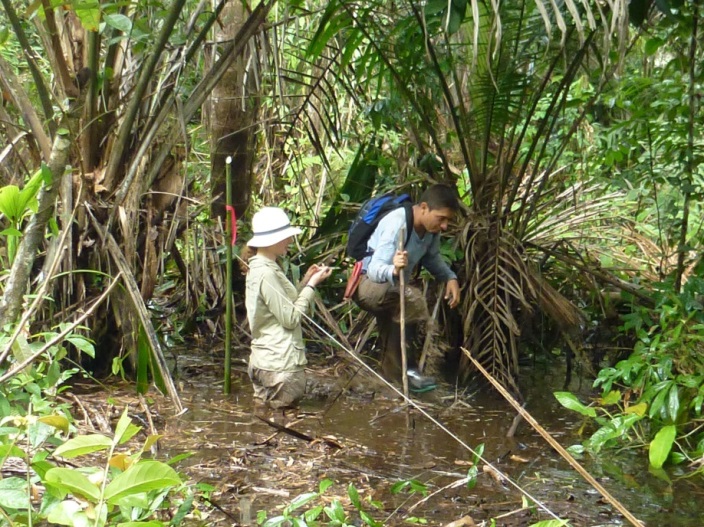
I sat on a log for a while. Nearby there were thousands of ants clambering over a tree, with which they enjoyed a symbiotic relationship. In return for providing the ants with a home, its appreciative occupants would sting any predators that came close or threatened it. I learnt this only too well by experiencing these painful stings for myself.
Once the plot was set up we headed back, and it started to rain heavily (muchas juvia), so we hurried along as best we could. When we returned we sheltered underneath a wooden structure with a corrugated metal roof that housed a smelly well. Here we waited twenty or so minutes for the others who were lagging behind. When they returned we went into the river fully clothed to try and rid ourselves of the mud. It was really refreshing to wash in the river and put on some dry, clean clothes. What luxury! This done, we played cards, chatted and ate dinner.
The toilet facilities in San Roque were far from adequate. Firstly, it didn’t flush which was pretty standard for the river villages and cities in Peru. More significantly though, there was no bin here in which to dispose of the toilet paper. As a result, there was a pile of dirty paper on the floor, which the lady must have swept out every week or so.
I could not help but notice the stark contrast between jungle life and city life in Peru. The unexpected turn of events at the very start of my outward journey to Peru highlighted this; two hours into my final flight to Iquitos from Lima, it was announced that bad weather had made landing impossible. So the plane turned around and went all the way back to Lima. Here I was confronted with a massive queue for rebooking tickets. But luckily, a group of missionaries spoke English, which was hugely helpful. When I finally got to the flight assistant at the desk he told me that the next flight would be the following day at 10.30am. The thought of waiting in the airport for 24 hours made me break down in tears. I had already waited in Miami airport for seven hours and had been traveling for what felt like an eternity. The tears worked and he took pity on me, arranging in the process for me to stay in a hotel in Lima, while ordering a taxi for me.
I shared the taxi with a young Peruvian couple and a middle aged man who spoke good English. On the way we passed through some very poor areas in which bedraggled individuals would stand in the middle of the road begging for money. Others were juggling or dancing for small change. Lima was coated in a layer of smog and I was fearful that the hotel would not be up to much. My anxieties began to grow as we were led down one seedy side street after another. However, I needn’t have worried. On arrival, a smartly dressed porter leant into the boot of the car, took my bag and led me to a grand hotel reception decked out in a sea of elaborate shiny marble and granite. This was the five star Sheraton.
When the door of my room was opened for me, a stunningly elegant room was revealed with a king sized double bed. Here I would enjoy the delights of a free lunch and dinner.
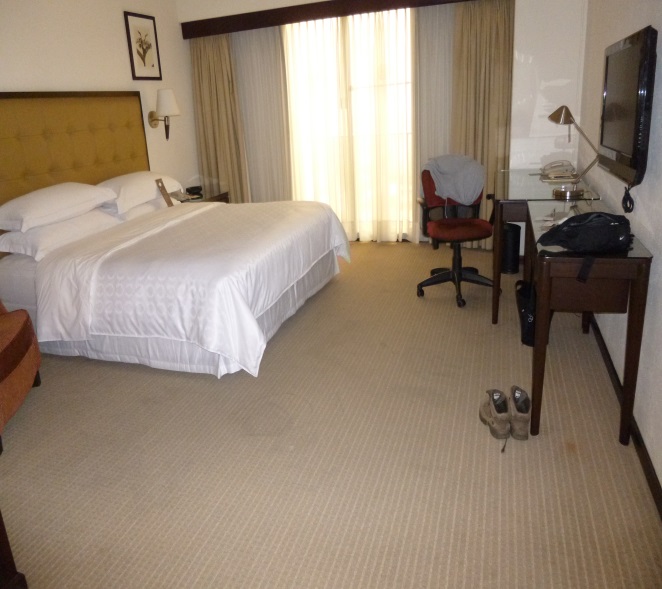
Eating lunch on my own was a bit lonely. I had ceviche (a Peruvian speciality of raw fish marinated in lemon juice). Needless to say, it was delightful. I also drank papaya juice, which was to become my favourite Peruvian juice. Over dinner I bumped into a group of missionaries who invited me to eat with them. While telling me about their work and how they help villagers, they warned me of the hardships of living in the jungle and concluded by saying that they would pray for me.
The following morning I couldn’t help noticing police with shields outside the hotel. It seemed that I was leaving at the right time – before whatever protests were about to commence.
I boarded the plane with a lady called Margarita who took me under her wing; she had also been staying at the Sheraton hotel. When we arrived in Iquitos I met Freddie, and Margarita got her taxi driver to carry my bag and then offered Freddie and I a lift in her taxi. We politely declined, but not before being introduced to her entire family. She was just the first of many friendly characters I was to encounter in this remarkably hospitable country.
In contrast to my experience at the hotel – the smartest I have ever experienced, life in the river villages could not have been simpler and more basic. Indeed, here again, I had not experienced anything quite like it. Whereas in Lima one was greeted by the busy hustle and bustle of everyday life, and the stark divide between rich and poor, here in the river villages there seemed to be more equality and a fairer share of resources. This said, there was still a subtle hierarchy of sorts; the mayor’s family, for instance clearly enjoyed a somewhat higher status than others in the region.
Over the next few days we returned to our plot to take measurements. My role was to measure the heights of the palm tree species by using a laser range finder. It took some getting used to at first but once I got the hang of it all was fine and dandy. First Hulio would measure the diameter of the tree. Then Louis would identify the tree type. This was done for every tree with the diameter of more than 10cm in all the 13 subplots. If Luis could not identify the tree type, a cutting would be made and later taken to the herbarium to be identified. To take such a cutting, Hulio would climb the tree with a piece of rope tied around both boots to give him grip against the bark of the tree. It was hard to move around the plot as most of it was covered in fairly deep water. I got bitten a few times by ants and stung by a wasp. Apparently, at one point there was a massive spider on my back. It was probably just as well I didn’t see it. This said, I did get to see several tarantulas and creepy crawlies, which were fascinating, although a bit unnerving at times.

On returning to the village each day we would go straight into the river to wash. When you’ve been hard at it all day in the jungle, the humidity makes you sweat profusely, so the daily bath in the river was blissful.
By this point we had swapped our simple peque peque boat for a speed boat. So on leaving San Roque we witnessed a flurry of socks, underpants and shirts take to the air; we had forgotten entirely that our clothes had been left drying on the roof of our new boat. Hulio turned the boat around swiftly and we used Luis’s stick to fish out our garments before they sank to the bottom.

Having averted disaster, we finally arrived at Santa Rosa de Lagarto, the next village, twenty minutes later. While here, we topped up with fuel and stayed in the mayor’s house. This gave me the opportunity to befriend the mayor’s young daughter and practice my limited Spanish while engaging in a game of hide-and-seek.
This village was more developed than the last as it benefited from a government scheme to place a proper toilet in every home. Needless to say, sanitary toilet facilities are vital in preventing disease, harmful bacteria and illnesses. This aside, the village also enjoyed electricity, made evident by the presence of massive speakers on the paths through which announcements were regularly made.
The following day the mayor gave us a lift in his boat to the nearby palm swamp where we set up another vegetation plot and collected further data. When we returned, the mayor’s wife had slaughtered a chicken for us and had cooked up spaghetti with tomato sauce and chicken pieces, along with a rice dish. Rice seemed to be the staple dish that came with every meal – including breakfast. It’s probably the only time I have eaten a rice dish with chicken, which actually made use of most parts of the chicken including its feet. Normally, this might have turned my stomach, but in the circumstances, I barely batted an eyelid and tucked in; I was quite simply too hungry to care.
The final river village we visited – Santa Rita was by far the most advanced we had experienced. It even boasted a hostel where we stayed. The hostel had actual beds and a mosquito net as well as a clean toilet (this said, it did not flush or have a toilet lid). There was even a shower room, though I use the term loosely. By shower room I mean a room with a vat of river water and a bucket. But the rooms were clean and hygienic, Bliss! Though all my clothes were grubby by this stage, I didn’t see the point in washing them so close to the end of our journey.
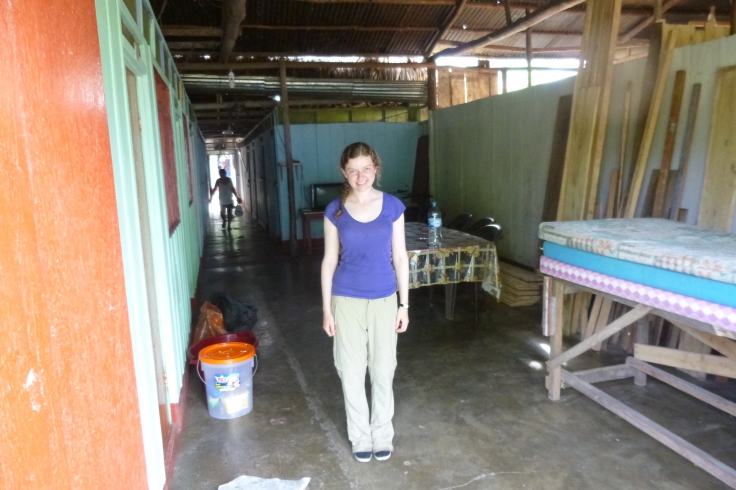
In Santa Rita we set up a vegetation plot in the nearby forest, which involved walking quite a distance into the forest until we reached the area to set up the plot. Like the previous plots, this one consisted of much water, mud and tricky obstacles to negotiate. So I held Hugo’s hand most of the way again, and still managed to fall over. When we got back, I was sweating terribly and covered head to toe in glorious mud. It was a pretty hot day, so we went to the river to wash our boots and trousers – though mine seemed to get muddier. Then I went into the hostel for the best shower ever. For dinner we tucked into some traditional salty fresh fish and boiled plantain. I can’t say it was the best I had sampled; it tasted of, well nothing really. It was incredibly bland. However, on the plus side there were no eggs in sight – brilliant! To make up for the lack of eggs for dinner, I ate six eggs the following day – two for each meal.

Our next task was to measure our plot, and in doing so, we noticed several villagers passing by carrying large bags over their shoulders. We strongly suspected that they were out hunting monkeys – an activity that is illegal, and carries a hefty fine. On our return, we spotted an enormous tarantula, as well as the tiny and highly agile squirrel monkey.
While walking back, one of the villagers who had been showing us the way started panicking and running away from us really fast. I was baffled and simply froze on the spot. Hugo immediately focused on the cause of this excitement – a huge swarm of wasps hovering around a nest very close to me. He came running over and pulled me to safety. I got away without a single sting, but sadly, Hugo was not so fortunate and received many bites on his back. He had been my knight in shining armour or in Spanish as he didn’t speak English (heroe).
After many days travelling by boat in the jungle from village to village, we eventually started our journey back to the city of Iquitos. From there we took a massive taxi with all our kit and headed back to the hostel in Iquitos. It was pouring with rain and some of the water managed to seep in through the roof of the taxi, so we got a bit of a showering. Despite this design fault, it did have a TV, so we watched some salsa videos on the ride home while getting a little wet. I wonder how many taxis there are in the city that have the luxury of TV but aren’t in the least bit rainproof.
When we finally returned to our hostel in Iquitos, we dried off and had pizza for dinner. It was a heavenly meal and nice to be back in La Pascana hostel with a real shower even if there was still no hot water.
A whole week of civilisation in Iquitos passed in no time at all, and before I knew it, it was time for me to leave. I woke up early to finish packing my things, which didn’t take long and then Freddie and I went out for our last breakfast. When we got back to the hostel I collected my bag and went out into the lobby to say farewell. I gave Louis and Freddie a bottle of rum for the team as a thank you for everything they did for me. Reluctantly, I got into a motor taxi, waved goodbye and left for the airport. As we bumpily rode to the airport I couldn’t help but shed a tear. I will miss the lively delights of Iquitos; the hospitality of its people; and of course, the enchanting world of the Amazonian rainforest; its remarkable wildlife and inhabitants; its breath-taking vistas; and yes, even the creepy-crawlies and the stings and bites. My experiences here will stay with me for many years to come, and I am incredibly grateful and honoured to have had the opportunity to witness it for myself.
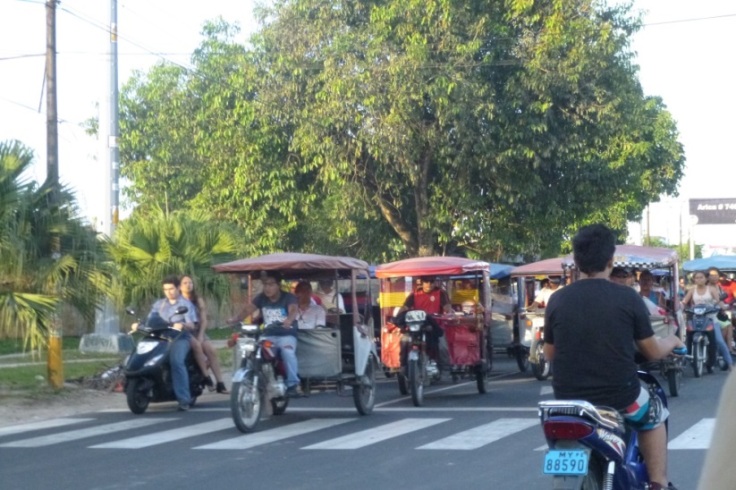
At Iquitos airport I found myself speaking to a lady in Spanish about the weather and my time in the jungle. Of course it was pretty basic but it just goes to show that I must have picked up far more Spanish than I had realised.


Leave a comment